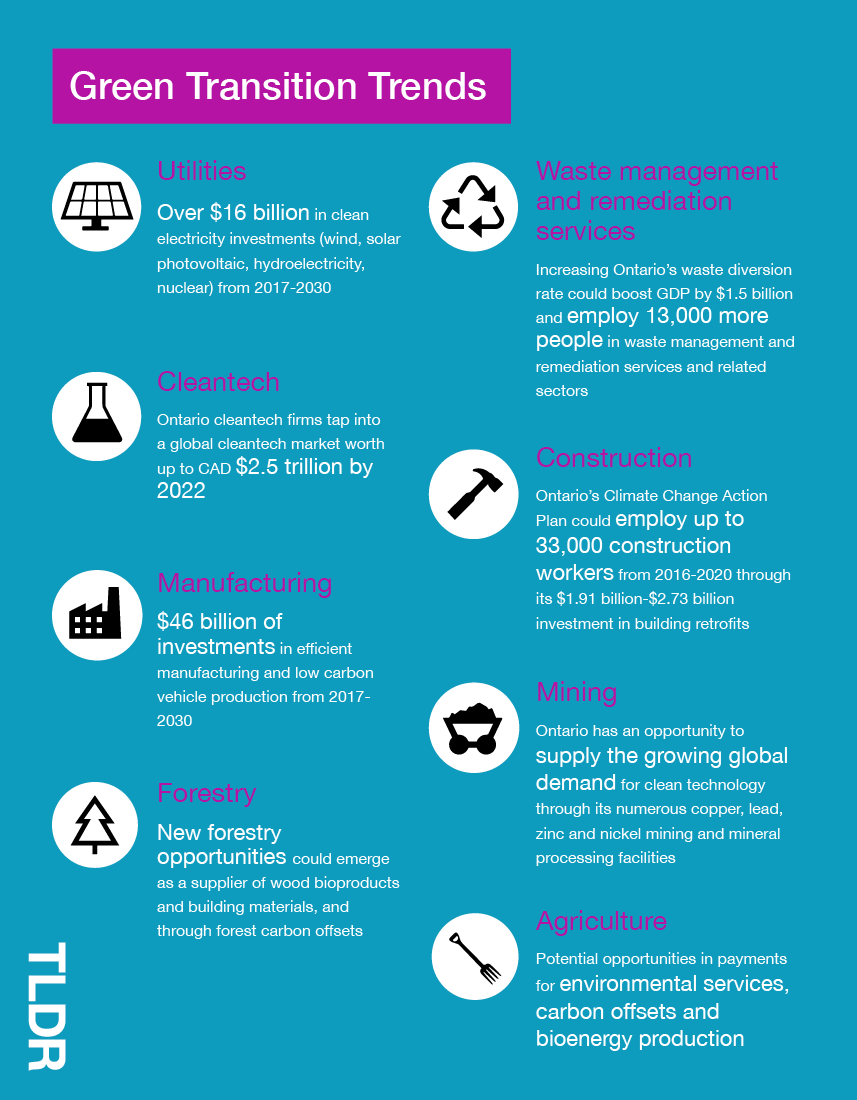October 19, 2017
Economies around the world are in transition as businesses, citizens and governments embrace new ways of generating growth that put less strain on the planet. In Ontario, this green transition will restructure our economy and existing sectors in ways that directly impact workers.

The individual worker experience and opportunities for decent work cannot be ignored amid the broader transition to a green economy. The Mowat Centre and Smart Prosperity Institute have partnered to explore these challenges and promote a conversation between those actively supporting the transition to a green economy and those advocating for decent work.
Ontario’s green transition is occurring at a time when the province is already experiencing significant changes. Over the past two decades, our economy has largely shifted away from goods production and toward a more service- and knowledge-based economy. Rapid technological change is playing an increasingly important role in these structural transformations, as the adoption of automation and artificial intelligence may threaten existing occupations.
The nature of work itself has also changed dramatically, as Ontarians are increasingly likely to find themselves in precarious employment with less security and fewer benefits. Furthermore, wages have remained alarmingly stagnant amid rapidly rising costs of living and inequality persists on a number of levels.
Public policy has a pivotal role in ensuring that Ontario’s green transition is just and equitable.
These changes are not equally distributed across society. In fact, the negative impacts of such economic shifts are often more pronounced among communities that already face significant barriers to opportunity, such as racialized populations, Indigenous Peoples, women, newcomers, workers with disabilities and rural Ontarians.
Our province is now facing another set of disruptions, driven by a global shift toward a model of less polluting and more resource-efficient growth. In order to be consistent with emissions reduction targets outlined in the Paris Agreement, widespread transformation in nearly all economic sectors will be required – from changing how we build and power our homes, to radically altering how people and goods move from one place to another.
Ontario has shown leadership through its linked cap and trade program with Québec and California, its new Strategy for a Waste-Free Ontario, and its burgeoning clean-tech industry. A literature review and modelling exercise conducted for Decent Work in the Green Economy suggests that these changes will likely lead to accelerated GDP and employment growth in sectors such as utilities (especially renewable energy), but also to disruption and potential contraction in others, such as heavy industry (e.g. petroleum refining). Many other sectors may not change much in size, but see significant alteration and require different skillsets than they did in the past.
This directly impacts workers on the ground. Sectors that are expected to grow have higher wages than the provincial average but also require higher levels of education and specialized skills, which raises important questions around access to post-secondary education and re-training programs.
No less importantly, a number of historically disadvantaged and equity-seeking groups may face additional barriers and pressures in this transition. For example, women and racialized populations appear to be underrepresented in the utilities sector, which is expected to see rapid growth. Heightened credentialism may disadvantage newcomers to Canada, and remote communities may face disproportionate disruption in the event that workers find their skills obsolete.
Public policy has a pivotal role in ensuring that Ontario’s green transition is just and equitable. Tackling these challenges will require a combination of universal programs and targeted measures carried out in a collaborative effort between governments, employers, unions and non-profit organizations. By developing a comprehensive “Just Transition Strategy” policymakers can proactively address these upcoming changes in a way that can reap the benefits, mitigate the negative impacts, and provide support where gaps emerge.
Policymakers should consider incorporating the following key components in such a strategy:
- Build decent work considerations into the design stage of policies and programs that are intended to transition the province to a green economy.
- Consider the anticipated changes associated with the green transition in the development of broader social supports, such as affordable child care and Employment Insurance (EI).
- Target workforce development to ensure that formal education, re-training initiatives, apprenticeships and experiential learning programs are relevant to the green economy. Strategic efforts to improve diversity and inclusion should be incorporated into these initiatives.
- Address gaps through a Just Transition Fund to support individuals, industries and communities negatively impacted by the green transition.
- Leverage government procurement and spending power to channel public funds into projects specifically aimed at both facilitating the green transition and providing decent work, for example through Community Benefits Agreements.
- Strive for better, more granular and more frequent data collection to provide policymakers with a better understanding of growth opportunities, skills demands, job security and wages.
- Establish mechanisms for regular dialogue and consultation with various groups, including workers who are directly impacted by the transition, as well as employers and industry, to understand the changing employment landscape.
Everyone has a role in this transition. If we fail to ensure that the green transition is just and equitable, we will have missed a vital economic and environmental opportunity to draw upon the diverse skills and perspectives of all Ontarians in solving today’s most pressing challenges.
Authors
Jordann Thirgood
Scott McFatridge
Mercedes Marcano
Release Date
Oct 19, 2017








